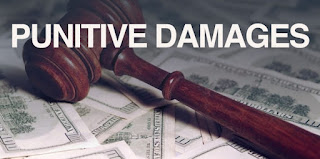Punitive Damages (exemplary damages)
Punitive Damages (exemplary damages)
punitive damages are payments awarded by a judge or jury to punish bad actors engaging in reckless, willful, malicious or wanton conduct, and to deter similar wrongful conduct in the future.
Punitive damages are not awarded in all cases. They are typically only awarded in cases where the defendant's conduct is found to be especially egregious, such as in cases of fraud, intentional infliction of emotional distress, or reckless disregard for the rights of others.
The amount of punitive damages that can be awarded is typically capped by law. The cap is designed to prevent punitive damages from becoming excessive and to ensure that they are proportionate to the defendant's conduct.
Examples of this would be drunk driving or distracted driving for an individual case. For corporate an employer is said to be vicariously liable for the acts or omissions of an employee when the employee engages in wrongful conduct while within the scope of employment.
Punitive damages differ from compensatory damages, which are intended to compensate a victim or claimant for injuries or harm sustained. Generally, punitive damage awards require a compensatory damage award.
Usually, punitive damages are awarded only if there has been proof of intentional bad acts, and most insurance policies also exclude coverage for damages caused by intentional acts of the insured.
Some jurisdictions allow punitive damages to be insured. It can be obtain through damage coverage on umbrella/excess policies.
Punitive damages are not always covered by insurance. Because punitive damages are not intended to compensate the injured party, they are not always covered by insurance.
#benewinsurance #insurtech #inclusiveinsurance #insurance #reinsurance #takaful




Comments
Post a Comment
Thank you for making this valuable comment.